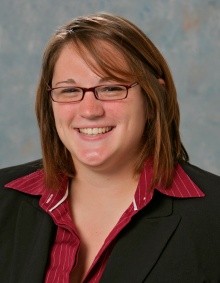A turn to the head of the classroom

Angelyn McDuff ’12 changed the path of her legal career, moving from positions in compliance and regulatory analysis into immigration law. Now, as a newly hired instructor in UB School of Law’s Legal Analysis, Writing and Research (LAWR) program, she’s adjusting that path again.
O’Brian Hall is familiar territory for McDuff – as a UB School of Law adjunct instructor, she taught courses in international legal advocacy and coached the law school’s teams in the Jessup International Law Moot Court Competition.
It was that experience, she says, that inspired her to look beyond compliance work to the next chapter of her professional life. “It was wonderful and fulfilling, and I loved the students,” she says. “And I realized that I needed something else to make me feel like the work I was doing mattered. I wanted a more meaningful career.”
She spent an intensive year back at the law school earning a master of laws degree, and in the process decided to specialize in immigration law. After completing the LL.M. in 2018, she worked as a staff attorney for Journey’s End Refugee Services, on Buffalo’s West Side.
Now, as a LAWR instructor, she will guide a section of 25 students through their first year in law school, helping them build the essential skills of lawyering.
“I have them do a lot of exercises in class, practicing the skills they need,” McDuff says. “How do you read a case and brief a case? This is the very beginning for them. They get real-time feedback on how what they’re doing needs to change, so they can learn to be concise in what they’re writing and use analogies that will show a judge or a colleague how a case really should come out.”
Her students also have to stow their laptops during class – she wants their brains engaged as inquirers, not stenographers. “I want them to focus on what I’m saying, not on writing down every word on the PowerPoint slides,” she says. (She does post the slides online for later study.) She also holds her students accountable to high standards in their written expression, using a proprietary software program called Core Grammar for Lawyers. The expectation is that by the end of the first semester, they’ll be at 90 percent grammatical proficiency.
It’s a more intensive and intentional approach to teaching the lawyer’s essential skills, McDuff says, than when she was first in law school. “The great thing about the LAWR program,” she says, “is that it allows focused and individualized feedback so each student can grow the skills they need to become successful lawyers.”